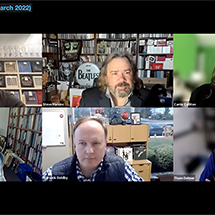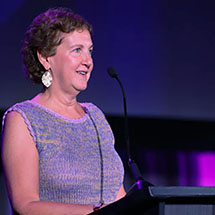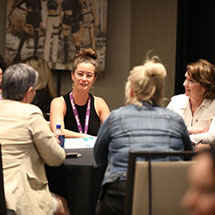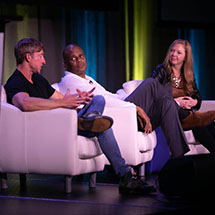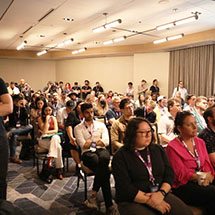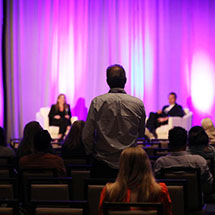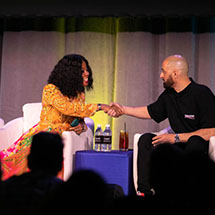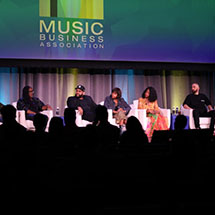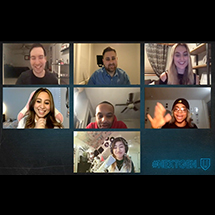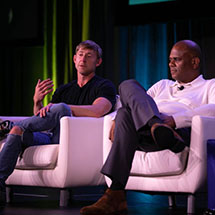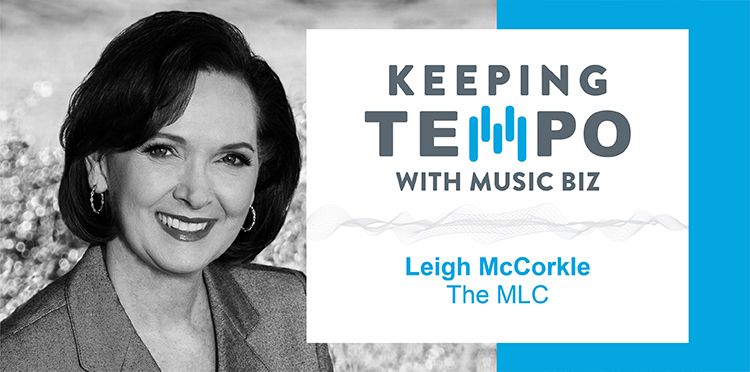
[Keeping Tempo With Music Biz] — The “Human Side” of Music Data Processing & Rights Administration: Working at The MLC with Leigh McCorkle, Chief People Officer

The passage of the Music Modernization Act (MMA) in 2018 led to the formation of what is becoming an important fixture in the modern industry: The Mechanical Licensing Collective. The organization has been tasked with collecting, tracking and paying royalties to the rightful creators & copyright owners, and administering blanket licenses for U.S. streaming & download platforms. At the heart of this highly technical data collection and payment processing is a team dedicated to ensuring that artists are fairly compensated, so they may continue to do the work they so love and we as music fans can enjoy their output. We discussed this with The MLC’s Chief People Officer, Leigh McCorkle, who gave us insight into what inspires the organization’s team, how the industry at large can support its mission, and much more!
Music Biz: Launching a new industry entity is no small feat, particularly in the midst of the past year’s global pandemic. Can you speak to The MLC’s progress in adhering to its pre- and post-launch timelines — how are operations fairing at this stage of the game?
Leigh McCorkle: Yes, progress to our pre- and post-launch timelines has been remarkable, even with pandemic challenges. One would think that it’s normal for a startup to have starts and stops for deliverables. This wasn’t the case with The MLC. Our guiding principles kept us focused on excellence and service, including integrity of our commitments. Our team worked extremely hard to meet the deadlines expected of us, relying on creativity and resiliency and many times even exceeding those deadlines. Pandemic or not, we had to be ready. Our operations are largely stable at this time. We are working to find more process efficiency and effectiveness. There are plenty of meetings to debrief on what happened, discuss what could be better next time and review process data for improvement opportunities.
Music Biz: From your earliest days, it seemed as if The MLC was planned to remain functional and interconnected even in the face of unknown challenges like the pandemic. Can you talk about the company structure you pursued at the organization’s outset, and how that has either evolved or remained the same?
LM: At the onset, Kris Ahrend, our CEO, saw an organization that was more aligned around teams than a traditional hierarchy of levels. We adopted a concept called, “Triple A” which stands for Alignment, Autonomy and Accountability. In the beginning, our team was small. With less than 20 people, input for decisions can come from just about everyone. It didn’t take too long to reach alignment, execute with autonomy and follow up with the results. When you continue to grow, that dynamic is more difficult given the pace of which decisions need to be made and the depth of knowledge needed for specific areas. Our structure has evolved to have more specialty teams that consist of four to six members that focus on a specific strategic area. For example, the Support Strategy team consists of members from Customer Experience, International, Legal, Rights Management and Royalty Finance. This allows the team to fully explore strategies to support our members more and determine timing and levels of execution. We continue to apply the Triple A concept, now across multiple strategy teams.
Music Biz: As an organization that has needed to hire from the ground up, what skills would you identify as most important for a professional to navigate the modern music industry, both as it exists today and with new changes looming on the horizon?
LM: The skills that we found most important for professional growth were service-related skills and analytical skills. I believe that both these skill areas are essential to navigate professional growth in the music industry. We looked for individuals with strong service skills sets, such as excellent communication skills, high attention to detail and an ease in building rapport. These skill sets can build on what is strong in the music industry already — networking, connections and relationship building.
At the same time, given the changing focus on data in the industry, we knew our team needed various levels of analytical skills. We looked for individuals with strong use of Excel and experience with evaluating data in spreadsheets or programs. Given our startup arrangement, with a team working throughout the U.S. and the U.K., we looked for people who would be flexible with our work arrangement, ready for changing directions and self-starters. These skill sets are emerging in the music industry and influencing decision making for both creators and business professionals.
Challenges looming on the horizon will show a shift to an even higher expectation for analytical skill and will be coupled with a need for process improvement skills. Reducing process waste and increasing efficiency will continue to be a big part of an industry remaking itself again and again. It’s important to make processes as simple as possible to allow more room for strategic growth of new ventures.
Music Biz: What opportunities to make a difference in the music business does The MLC offer to experienced workers, entry-level professionals and interns alike?
LM: An excellent question — our team is composed of individuals with a variety of experience. The leadership team has deep experience within their given functions and with enterprise leadership. Some of our leadership team have past music industry experience and some do not. Before joining The MLC, only three had previously worked with each other. The value of what we all bring to the table is incredible; questioning each other and offering new ways to approach our work, all while still having a degree of freedom to make this organization special.
We also were intentional in hiring entry-level professionals last summer that could start their careers with us. The selection process was rigorous for our entry-level hires, including one-way interviews, assessments of Excel & service skills, and cultural interviews. Out of 250 applicants, we selected 10 to join us in July 2020. Since then, many of them have moved into special areas of expertise. As with most employers, you need to balance how much experience you really need for a given job with how much room is there to “grow our own.” I’m confident we have a good balance. Our leadership team engages so many of our entry-level professionals in the work and I can’t help but think how rich this experience must be for them.
Given that we are still starting up a few last areas of the business, we’ve chosen to bring interns into the fold later. Our approach is to engage interns when we are ready to mentor them while working on key projects.
Music Biz: There’s a lot more to The MLC than the collection and processing of data to assign proper royalty payments. The company is home to people passionate about ensuring fair compensation for artists and rightsholders because of their own love for music. Can you discuss this human element of The MLC?
LM: This is probably one of my favorite topics to share about The MLC. At the end of the day, even with the right tools and technology, processing payments can be a complicated and technical exercise. It includes lots of review and evaluation of data to make sure that correct royalties are distributed timely. What is outstanding about The MLC is that we provide a very “high-touch” element from our Customer Experience and Rights Management teams. The stories I hear about songwriters calling and emailing us for help are simply moving. To know that someone on our team finds joy in helping a songwriter figure out how to use our website for the first time makes me extremely proud. In the music industry, it is sometimes said you have to “know somebody” to get an answer or help with a problem. We are here for any of our members with expanded hours and a deeply educated team. Our human element is what makes us so different and creates a special connection for our members.
Music Biz: On a broader scale, what would you say excites your coworkers about coming into work every day?
LM: Great question. Let me just say, regardless of how much you love the mission of an organization, it’s still work at the end of the day. We all have gone through times when we need a break, we are tired and maybe could use a little extra sleep. What I think excites us is that we are doing something in the music industry that is not only making a difference in peoples’ lives, but is also making history. We are in the preliminary stage of a new era in mechanical licensing, which means that our team regularly gets to be a part of plenty of important “firsts.”
Music Biz: The work of The MLC is more than just what the entity can accomplish on its own, calling for collaboration from many within our industry to properly operate. How can the music industry as a whole support your endeavors, and help get creatives on-board with registering works with The MLC?
LM: To be honest, for so many months we’ve thought so much about what we can do for our members that I haven’t given this as much thought. My first reaction is to say that when people in the music industry support The MLC, they are supporting their own interests as well.
I think my suggestions would be three-fold. First, invite us to partner with you on efforts with your industry communities; bring us in for conferences, festivals or education with songwriters. We are a fun crowd and enjoy building relationships! Second, share our story on social media. It helps to amplify our message across one’s network. Finally, introduce us to others you know that would help us get the word out about joining The MLC.
Music Biz: As 2021 draws to a close, can you give us a sense of what the new year might have in store for the MLC?
LM: Yes, we have so much in store for us next year, including the launch of several new tools and resources for our members that will enhance and improve their experience with us. Our team will also be hard at work processing and matching the more than $424 million in historical unmatched royalties we received from digital services earlier this year, to hopefully begin distributing those funds sometime in 2022.
Most of all, we will be in-person in more places. We plan to be in conferences, in panels, in meetings and anywhere we can get to meet face-to-face. We plan to be in our new building more often and look forward to sharing our space with our members. We can’t wait to meet them in person!
You can read past “Keeping Tempo” articles via the portal linked here. And, stay tuned for more insightful discussions from our members and partners from across the industry!

